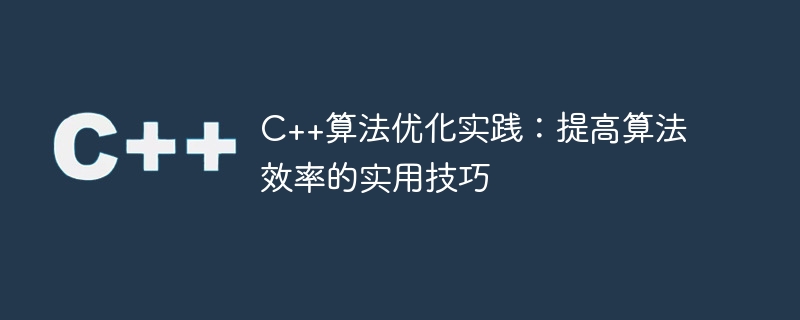

With the increasing popularity of computer applications, algorithm efficiency has become a concern for more and more programmers. For high-level languages like C, although its compiler can perform certain optimizations, in actual application scenarios, algorithm efficiency optimization still plays a crucial role. This article will introduce some practical techniques for C algorithm optimization to help readers improve algorithm efficiency.
The most basic optimization method is to first consider using a suitable algorithm. For unconventional problems, we should comprehensively consider factors such as data size, time complexity, and space complexity to select appropriate algorithms. For example, in a sorting problem, insertion sort or bubble sort can be used for small-scale data; while for large-scale data, quick sort or merge sort can solve the problem more efficiently.
C is a strongly typed language, and the compiled code efficiency is relatively high. However, in practical applications, some details often lead to a decrease in efficiency. Therefore, we need to consider some code-level optimizations, which include:
(1) Avoid double calculation: In C, function calls are expensive. If a large number of repeated calculations occur in a function, the efficiency of the program will decrease. Therefore, double calculations should be avoided as much as possible when writing code.
(2) Choose an appropriate data structure: The choice of data structure directly affects the efficiency of the algorithm. For example, when looking up whether an element exists, we can use a hash table for fast lookup instead of using a linear table sequential lookup.
(3) Optimize loop structure: In loops, we should make reasonable use of conditional judgments and loop variable updates to avoid useless calculations. In addition, reducing the number of cycles as much as possible is also an effective means to improve efficiency.
The Standard Template Library (STL, Standard Template Library) is part of the C standard library and contains a series of template classes and functions. The algorithm part provides some commonly used efficient algorithms. Using STL algorithms can greatly simplify the code and improve program efficiency. For example, in a sorting problem, using the sort function can quickly complete the sorting operation.
Memory management is also a key factor affecting program efficiency. For example, when allocating a large amount of memory, new/delete operations should be used instead of malloc/free to avoid problems such as memory leaks. In addition, when using containers, copy operations should be avoided as much as possible to avoid useless memory allocation.
Finally, multi-threading is also a common means to improve program efficiency. In C, we can use multi-threading to divide tasks to improve program efficiency. When using multi-threading, you need to pay attention to synchronization and communication operations between threads to avoid problems such as data competition.
In short, C algorithm optimization is a task that requires long-term practice and accumulation. This article introduces some practical techniques for C algorithm optimization, including algorithm selection, code-level optimization, using STL algorithms, optimizing memory management, using multi-threading, etc. These techniques will help us improve algorithm efficiency and implement more efficient programs.
The above is the detailed content of C++ Algorithm Optimization Practice: Practical Tips to Improve Algorithm Efficiency. For more information, please follow other related articles on the PHP Chinese website!




